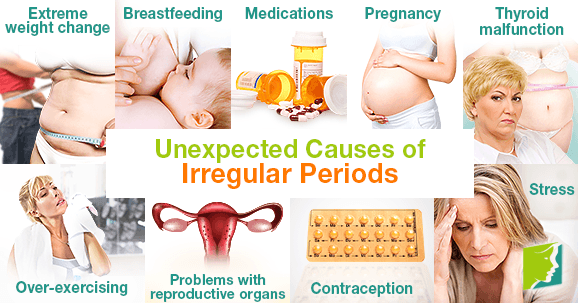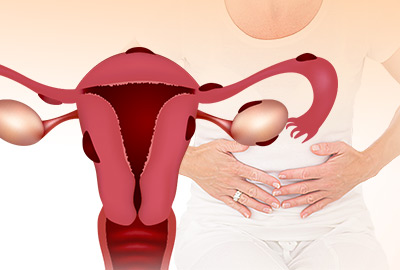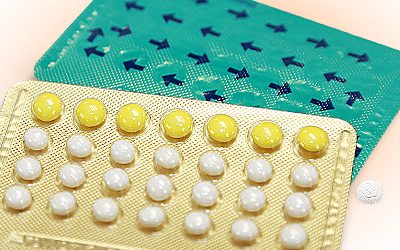As a general rule, a woman's menstrual cycle takes place over 28 days, and bleeding occurs for three to five of these. Any menstrual activity that differs significantly from this pattern is considered irregular. The association between menopause and irregular periods is widely known; as a woman approaches menopause, her hormone levels alter in preparation for periods stopping altogether, which causes periods to occur sporadically. However, the menstrual cycle is closely linked with a number of physical and emotional states of the body, and there are some other causes of irregular periods that may be unexpected.
Extreme Weight Change
Extreme weight loss or gain is likely to cause periods to become irregular or stop altogether. Losing or putting on significant amounts of weight during a short space of time is not good for your body. If you notice irregular periods alongside extreme weight change, you should arrange to consult a doctor to discuss your relationship with food, your weight, and help with creating a healthy diet plan.
Stress
Emotional issues are closely linked with menstruation. A period of significant change or stress in your life may cause your periods to become irregular, and they should become more routine again as the period of disruption in your life passes. If you fear that your stress levels are consistently high, you may wish to consult your doctor or a counselor to arrange treatment for exhaustion, fatigue, or anxiety.
Medications
Some prescribed medication can cause menstrual irregularities, particularly those that treat hormone disorders, such as polycystic ovary syndrome (PCOS). Some diabetes medications can also disrupt the regularity of periods.
Pregnancy
Many women assume that periods stop altogether during pregnancy, but sporadic spots of bleeding can still occur when a woman is pregnant, especially during the first few weeks. Treat significant bleeding while pregnant as a matter of medical emergency, as this could symptomize miscarriage.
Thyroid Malfunction
The thyroid is responsible for metabolism, growth, and hormone secretion in the body. The thyroid is closely linked with the reproductive system, and irregular periods can be symptomatic of a disorder. Other thyroid malfunction indicators to look out for include lactation, unexplained weight gain or weight loss, and mood swings.
Over-exercising
If you over-exercise, your body will begin to look for ways to preserve its energy. This can cause the shutting down of the menstrual cycle to prevent energy being spent on ovulation and periods.
Breastfeeding
After you give birth, your periods could return to normal within six weeks. However, you are unlikely to experience a period while you breastfeed, as this is your body's way of preventing pregnancy while you have a newborn to care for.
Contraception
Internal forms of contraception, such as the contraceptive implant and the pill, disrupt hormone activity in the body and can cause periods to either become irregular or stop altogether.
Problems with Reproductive Organs
Irregular periods can be symptomatic of potentially serious issues in your reproductive system, such as polycystic ovary syndrome (PCOS) or endometriosis. Keep an eye out for other concerning symptoms, such as unexplained weight gain, excessive hair growth, pelvic pain, and inability to conceive, and arrange a doctor appointment if you are worried.
Although women don't exactly get excited about the arrival of their period every month, most understand that a regular cycle is desirable, as it's an indicator that your body is functioning healthily. It is important to be aware of what your periods are telling you. If you notice irregularities in your cycle alongside other unusual symptoms, take it seriously, consider your health and lifestyle, and consult your doctor to rule out serious medical concerns if you're worried.
Sources
- Johns Hopkins Medicine. (n.d). Thyroid Disorders in Women. Retrieved February 24, 2014, from http://www.hopkinsmedicine.org/healthlibrary/conditions/endocrinology/thyroid_disorders_in_women_85,P00437/
- National Health Service UK. (2013). Contraceptive implant. Retrieved February 24, 2014, from http://www.nhs.uk/Conditions/contraception-guide/Pages/contraceptive-implant.aspx
- National Health Service UK. (2013). Periods, Irregular -Treatment. Retrieved February 24, 2014, from http://www.nhs.uk/Conditions/Periods-irregular/Pages/Treatment.aspx
- National Health Service UK. (2013). Polycystic Ovary Syndrome. Retrieved February 24, 2014, from http://www.nhs.uk/conditions/Polycystic-ovarian-syndrome/Pages/Introduction.aspx
- National Health Service UK. (2013). When will my periods star again after pregnancy? Retrieved February 24, 2014, from http://www.nhs.uk/chq/Pages/943.aspx?CategoryID=54&#close
- National Institutes of Health. (2011). Vaginal bleeding. Retrieved February 24, 2014, from http://www.ncbi.nlm.nih.gov/pubmedhealth/PMH0014910/
- Office on Women's Health. (2009). Endometriosis fact sheet. Retrieved February 24, 2014, from http://womenshealth.gov/publications/our-publications/fact-sheet/endometriosis.html




